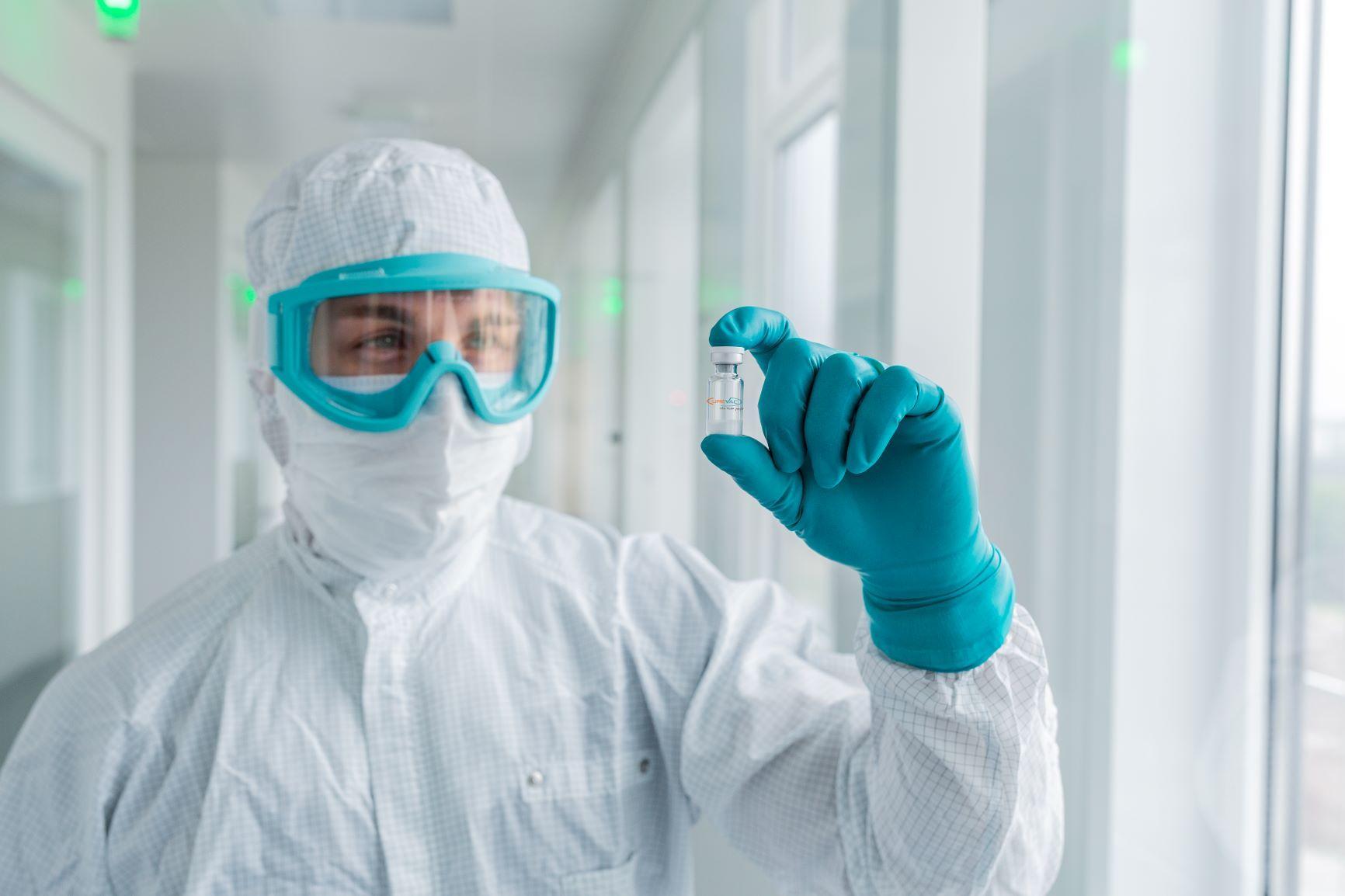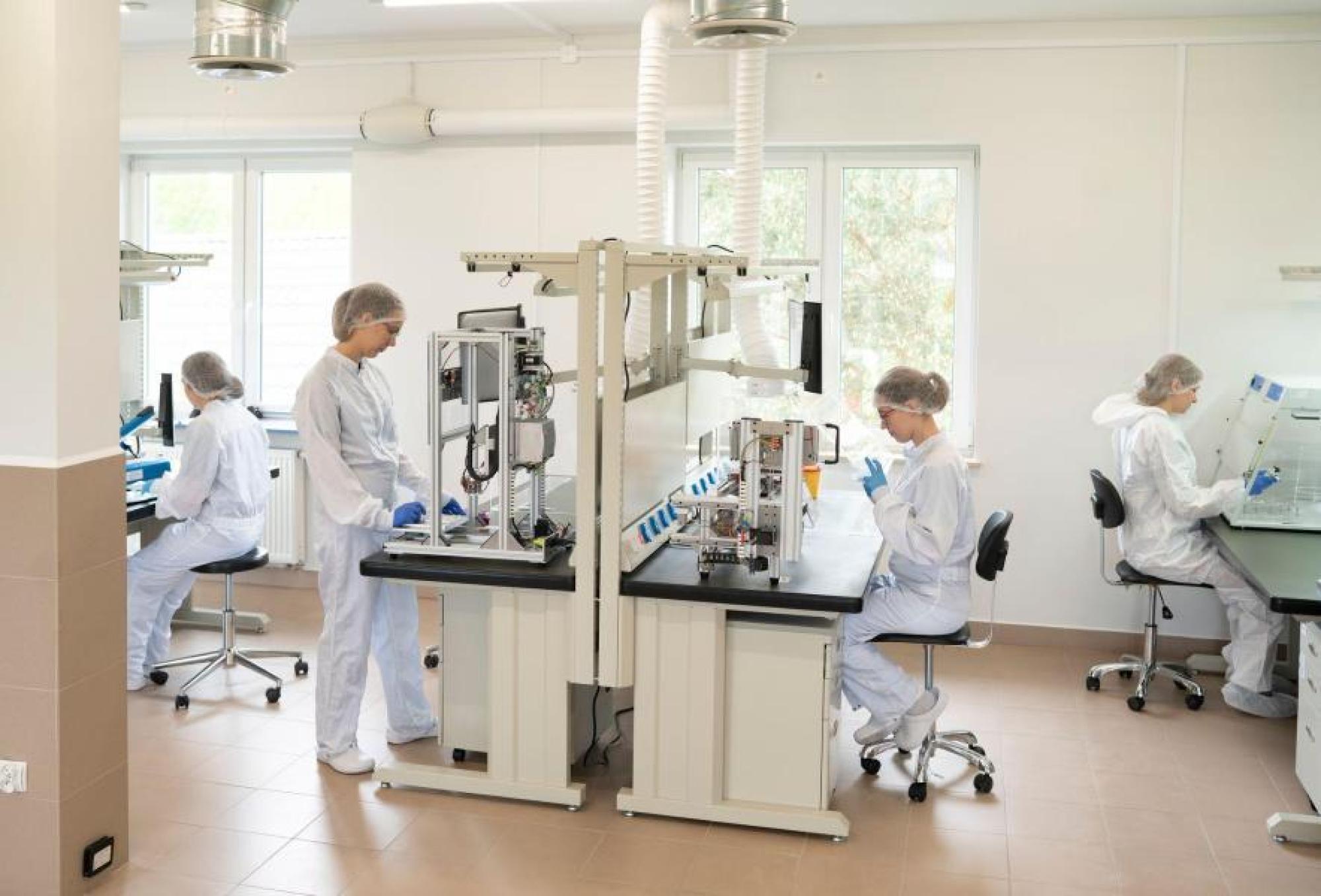Key investments support a full range of biotechnology and medical responses to the pandemic with COVID-19 vaccines, therapies, diagnostics
COVID-19 is a sly disease. It flits among the population and hides in people who have no symptoms. It disguises itself as a common cold or allergy. If we can flush it out with good tests, stop the spread with new vaccines and heal the sick with innovative therapies, the pandemic will end.
The European Investment Bank is backing dozens of companies that are working day and night to end the crisis. BioNTech, based in Mainz, Germany, has moved to the front of the pack in this race. The EU bank signed a €100 million agreement with the company in June 2020. This investment and other similar ones are backed by programmes such as InnovFin and the European Fund for Strategic Investments, which support innovative, higher risk projects.
“The most we can contribute to the fight against COVID is to help companies which are developing new vaccines, treatments or diagnostic solutions,” says Gergely Krajcsi, an investment officer at the European Investment Bank who worked on the BioNTech deal. “We did everything we could to support BioNTech, because, let’s be realistic, COVID is not going to go away by itself.”
At the start of the crisis, European Investment Bank staff started working on the health emergency and the economic downturn at the same time. The Bank divided its support for biotechnology and medical companies into three main sectors: vaccines, therapies and diagnostics. The aim: to track infections, stop the spread of the disease and care for those who get sick.
In April, the Bank approved €5 billion in new financing to support urgent action in fields such as healthcare and medical innovation for COVID-19. Since then, more than 40 biotechnology or medical companies and projects have been approved for EIB financing worth about €1.2 billion. This put the Bank at the forefront of the fight against COVID-19.
The European Investment Bank is also backing global programmes to distribute COVID-19 vaccines, especially in the developing world. For example, the Bank approved a €400 million deal with COVAX, a global initiative supported by hundreds of countries, the private sector and philanthropic organisations to promote equal access to a vaccine.
A review of companies to fight COVID-19
At the start of the crisis, the Bank reviewed its loan portfolio of existing deals and also searched for new companies that could do with extra help. Two companies identified were BioNTech and CureVac. The EIB was the first financial institution to support BioNTech’s coronavirus research. Meanwhile, CureVac, which specializes in treating rare diseases, signed a €75 million loan with the EIB in July to expand production capabilities at its site in Tübingen, southwestern Germany.

CureVac’s vaccine candidate for COVID-19 at its research site in Tübingen, Germany. The company specializes in treating rare diseases
Curevac and BioNTech’s vaccines are based on technology never before used in commercial vaccines. They could prove revolutionary for future vaccines. The technique takes non-infectious genetic material called messenger RNA and injects it into muscle cells. The vaccine enters these cells and instructs them to produce a protein resembling the spikes on the new coronavirus. This new protein prompts the immune system to make antibodies and activate T-cells to fight the virus, if the person is exposed to it.
“Messenger RNA vaccines are versatile in that they can be quickly adapted to mutations in the virus,” says Anna Lynch, a life sciences expert at the European Investment Bank. “Curevac and BioNTech vaccines can be modified within a matter of weeks to target a mutated virus if needed.”
Private investors are often wary of vaccines, because success is hard to predict. The Bank’s backing of BioNTech and CureVac shows how venture debt from a public bank is important to help companies innovate in the infectious disease sector, says Cristina Niculescu, another life sciences expert at the European Investment Bank. Ebola, SARS and now COVID-19 have been a wake-up call for pandemic preparedness and investment. As the private and public sectors step up support, more than 200 candidate vaccines have reached some stage of development around the world. Several are expected to be approved by the end of the year.
“The EIB’s goal here is to accelerate several promising candidates into large-scale production and global supply,” Niculescu says. “In the meantime we have a lot of very sick people, so we also need therapeutic solutions that target hospitalized patients and make sure they don’t progress to becoming severe COVID cases.”
Özlem Türeci, the chief medical officer at BioNTech, says her vaccine’s early success makes it possible today to have hope. “I don’t think we can say the pandemic is over,” she adds, “but this might be a contribution to the very beginning of the end.”

Hella Kohlhof, chief scientific officer at Immunic, had an idea as early as February that her company’s therapeutic medicine could help fight the coronavirus pandemic.
We will always need therapies
Key therapeutics companies backed by EIB loans include Atriva, Immunic, Pluristem and AB Science. The companies’ COVID-19 products are designed to treat people after they are infected, especially if they become sick enough to go to the hospital.
Atriva’s lead drug candidate, ATR-002, aims to reduce the viral load of RNA viruses such as COVID-19 and influenza, and hinder the spread of severe respiratory infections. The drug, taken as a tablet, has shown promising results in pre-clinical trials. It could offer much-need help for people with coronavirus symptoms that require hospitalisation.
Atriva’s therapy treats two aspects of the coronavirus: it stops the virus from replicating and prevents an overreaction of the body’s immune system. “We believe this dual approach could be extremely effective,” says Olaf Althaus, chief financial officer at the company, which signed a €24 million EIB loan in October. “We are very optimistic about ATR-002’s potential to fight the pandemic.” Atriva’s goal is to develop a broad-spectrum antiviral drug that will also be effective against new mutations of COVID-19 or new RNA viruses that could lead to future outbreaks.
Another October loan went to Immunic, which is using its €24.5 million from the EIB to work on a similar therapy, IMU-838. This medicine, also in tablet form, has a broad spectrum of antiviral benefits. IMU-838 is undergoing a phase 2 trial in COVID-19 patients hospitalised with moderate illnesses. The medicine also is being tested on chronic inflammatory and autoimmune diseases, such as multiple sclerosis.
“We had an idea in February, right when the pandemic reached a global scale, that our drug could work against COVID-19,” says Hella Kohlhof, a biologist in immunology and oncology who is the chief scientific officer at Immunic. “We knew from preclinical experiments that it already worked against hepatitis C, HIV and a few other viruses.”
COVID-19 started out as a supplementary project for Immunic, but it has grown into an urgent part of the company’s work. “We really felt we had a responsibility to do something,” Kohlhof says. “We already had the medication in place and we didn’t want to sit around and say, ‘We know it might work.’”
Immunic’s IMU-838 aims to reduce the severity of infections like COVID-19 in several ways. It prevents the replication of the virus. Then, it induces innate immunity and, finally, it may help the body’s immune system avoid overreacting to severe infections.
Immunic’s product works as a teacher instructing the body’s cells. “When cells in our body get infected with a virus and the virus wants to replicate, we have these very friendly cells in our body that say, ‘No problem I will switch on a new mechanism to support the virus’s need,’” Kohlhof says. “And then we end up with a huge amount of friendly cells doing this copying of new cells. The virus is hijacking the cells’ kindness. IMU-838 goes in and is able to block this mechanism by inhibiting the enzyme that supports the production of the friendly building blocks. It’s perfect, because IMU-838 blocks the infected cells, but not any other cells.”
AB Science signed a €15 million loan in November to advance the clinical development of its drug masitinib. The medicine, taken in a pill form, potentially has a dual anti-viral and anti-inflammatory action. It especially could help people suffering from life-threatening illnesses related to the coronavirus, including the so-called cytokine storm, in which the immune system overreacts to the infection. “AB Science’s research could have benefits for inflammatory diseases, neurodegenerative diseases, infectious diseases and cancers, so our support for the company might be expanded in the future,” says Yu Zhang, a manager in life sciences and biotechnology at the European Investment Bank.
The therapeutics companies hope their research will help a wide range of diseases. They say therapies will be needed for a long time, even if the vaccines are a success.
“First, not everyone will want to get vaccinated,” Atriva’s Althaus says. “Secondly, there will always be cases where the vaccines don’t work or can’t be used. After the airbag was introduced, ambulances were still needed.”
Therapeutic placenta cells
The Israeli-German company Pluristem, which signed a €50 million financing deal with the EIB in April, is taking a different route to a therapy. It is using placenta cells, which are the most potent cells in the human body, to treat severe infections.
Pluristem grows the cells from placentas in a 3D bioreactor that mimics the conditions of the human body. Injected into patients, the new cells help the body regenerate itself. The therapy may help patients suffering from complications of the coronavirus– pulmonary hypertension, lung fibrosis, or acute kidney and gastrointestinal injuries.
The placenta are collected after the delivery of healthy, full-term babies from women under 35 years old who undergo an elective caesarean section. “Those cells can then be used for the good of human kind,” says Auvo Kaikkonen, a senior life sciences specialist at the Bank.
Testing takes big role in the fight
Among the many lessons of the COVID-19 lockdowns has been the value of tracking and tracing the spread of the disease. Even before the pandemic, the European Investment Bank had backed research into advanced testing by Mobidiag, which operates in Finland and France, and Curetis, a German company whose platform is proving indispensable in the treatment of a large number of coronavirus patients, because it identifies the correct antibiotics to treat secondary bacterial infections.

A Scope Fluidics laboratory in Poland. The company is making coronavirus testing faster and more accurate.
The Bank’s most recent testing investment is Scope Fluidics of Poland. The company developed a fast system for detecting viral pathogens and bacteria. Called PCR/One, the fully automated system can identify – in 15 minutes – up to 20 pathogens and drug-resistant bacteria. The accuracy of the system means doctors won’t have to wait days for tests to identify COVID cases. It also means that people could be tested more often.
“The main advantage of our test is the speed,” says Piotr Garstecki, chief executive of Scope Fluidics. “Time is of the essence. It feels like we are at war.”
The EIB approved a €10 million loan for Scope Fluidics in September. Today’s quick coronavirus tests have a reputation for inaccuracy, because they test for COVID-19 antibodies. The problem is that some people who are infected may not yet have antibodies. This can result in a false result. The accuracy of Scope Fluidics’s PCR tests is almost 100%.
“There is huge demand for this type of device,” says Anna Stodolkiewicz, the EIB loan officer working on the project. “The PCR test is compact, very comprehensive. It can be used in airports, train stations, anywhere.”
Testing will remain crucial even after a coronavirus vaccine arrives. Large swaths of the population will not get the first round of vaccinations, which means that the coronavirus is likely to continue circulating widely. Scope Fluidics plans for its system to get approval from European regulators before the end of the year. As Europe suffers a second coronavirus wave and cases in the United States explode, knowing who is infectious has never been more urgent.
“Even massive testing,” Garstecki says, “is a better option economically than lockdowns.”
